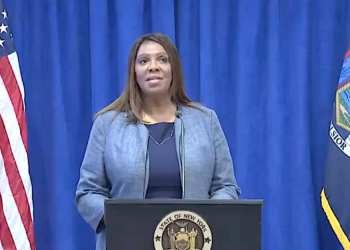When a new patient comes to his office, Doug Proper does a thorough examination, checking the head, neck, and inside and outside the body looking for problems that often only he can cure.
Proper isn”™t a medical specialist, though. He and his wife, Sharon, run their business, aptly named The Guitar Specialist, out of a two-story house on Route 22 in Goldens Bridge, where they fix anything with frets in any degree of disrepair.
“A shop like ours, we”™re a full-service repair shop,” said Doug Proper, who has repaired guitars for clients including Paul Simon, jazz masters John Scofield and John Abercrombie, and singer-songwriter Kevin Briody. “We see everything from ”˜my guitar”™s just not playing in tune,”™ all the way to the guy who backed over it in the driveway and everything in between.”

Hundreds of emails and phone calls come in daily with questions about everything from performance-related tweaks to major repairs. Guitarists frequently travel long distances to have their guitars serviced by the Propers.
“We had a guy drive here from Kansas this year because he didn”™t want to ship his guitar. We had a guy fly up from Alabama just to bring us his guitar,” Proper said. “We”™ve had guitars shipped to us from as far away as France and Hawaii. We have a couple customers that fly in from Dubai with their guitars.”
While the most common repair done at The Guitar Specialist is a “setup,” which entails tweaking the guitar to play its best, Proper attributes his shop”™s popularity to his willingness to do repairs that other shops won”™t consider due to complexity or risk. He said there are at most a dozen shops in the country that perform the level of repairs he and his wife offer.
“I got an email from a guy this morning. He needs a neck reset on a Guild and he”™s down in Virginia, and said he can”™t find anybody who is willing to take on a Guild for a neck reset,” Proper said. “For some reason, Guild guitars are more complicated to perform a neck reset because they have a different-shaped neck joint, and for the average technician, they just steer clear of them.”
Proper started fixing guitars when he was in high school in Lindenhurst on Long Island. Unable to afford expensive instruments, he bought inexpensive guitars at flea markets and learned to make them better. He put himself through college fixing guitars, earning a bachelor”™s degree in music at Manhattanville College in Purchase before striking out on his own.
Callers to his shop, Proper said, often begin by telling him, “”˜We”™ve heard that if you need a guitar repaired, you”™re the place to take it to.”™ We”™re thankful for that reputation. It”™s partially due to the level of work we do and part of it is just we”™re not afraid to do things. ”¦ Others would shy away because it would be too hard and too expensive and too much of a challenge, and I”™ve never had a problem taking on a challenge. Sometimes we”™ve regretted it, you know, but if it can be fixed, I”™ve always been happy to try.”
When guitars come through the door, the Propers assess what repairs need to be done and estimate the cost. If the cost of repairing the instrument is more than the guitar”™s value, they”™ll often counsel the potential client against having the work performed.
“We turn away a great deal of work,” Proper said. “You don”™t spend $1,800 fixing a $900 guitar. Do you spend $600 fixing a $900 guitar? Maybe, sure.”
The Propers recall one memorable instance where they did fix a guitar that was damaged beyond its value. A guitar worth no more than $200 had been shipped to the shop in horrible shape. When they took the guitar out of the box, they thought they”™d be shipping it back to the owner unrepaired.
“We were adding up the cracks by the yard,” Proper said. “It needed a new bridge, new frets, every brace in the guitar was loose, every seam was loose. It was a disaster.”
Proper called the owner and told him he couldn”™t even come up with an estimate on what it would cost to make the guitar playable again. The persistent customer asked for a dollar figure. “The bill was significant,” Proper said. “He, without hesitation, said, ”˜OK, let”™s do it.”™”
Unable to understand why someone would spend thousands to repair a guitar that badly damaged, Proper again tried to talk the customer out of making the repairs. He couldn”™t.
“He said, ”˜This guitar means the world to me. It”™s about the only thing, including quite a few comrades, that made it back from Vietnam with me,”™” Proper said.
It took three to four years for the couple to rebuild that guitar back to “like new” condition. “I was never going win that argument,” Proper said.















